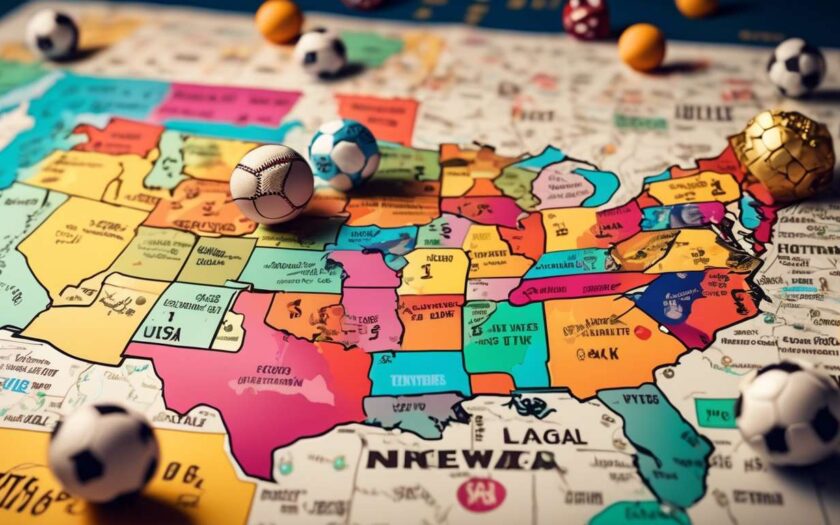As we stand at the cusp of a new era in sports entertainment, the landscape of sports betting in the United States is rapidly evolving. Many are curious about which states are jumping on the bandwagon to legalize and regulate sports betting as a means to boost their economies and engage their communities.
In recent years, the overturning of the federal ban on sports betting has paved the way for states to explore this lucrative opportunity. State legislatures are actively debating the potential benefits and challenges, weighing prospects such as increased tax revenue against concerns like problem gambling.
Our collective curiosity drives us to explore the motivations behind these legislative pushes and understand how they might reshape the way we experience sports.
As states line up to partake in this burgeoning industry, we delve into the intricacies of their efforts and the broader implications for fans and stakeholders alike.
Key Factors Influencing State Decisions:
-
Economic Benefits:
- Potential for increased tax revenue.
- Job creation in the gaming and related sectors.
-
Community Engagement:
- Enhanced fan experience and involvement.
- Opportunities for local businesses to thrive.
-
Challenges:
- Addressing concerns of problem gambling.
- Ensuring proper regulation and oversight.
Together, we watch as these developments unfold, eager to see how they will transform both the sports and betting landscapes in the United States.
Current State of Sports Betting Legalization
Many states are actively navigating the complex process of legalizing sports betting to capitalize on its economic potential. As we witness this shift, we’re seeing an exciting blend of opportunity and challenge.
We’re not just talking about passing legislation; we’re talking about joining a community of forward-thinking states that recognize the economic impacts, such as:
- Job creation
- Increased tax revenues
The push for legalization is driving us to rethink how we approach regulation and oversight while ensuring we foster a sense of belonging among our constituents.
By embracing these legislative changes, we’re collectively stepping into a new era where sports betting isn’t just a pastime but a significant economic contributor. We’re aware that every decision made during this process reflects our commitment to responsible growth and participation in an industry with immense potential.
As we move forward, we’re excited to see how these efforts will enhance our economies and strengthen our communities, ensuring everyone shares in the benefits.
Factors Driving State Initiatives
Several key factors are driving states to pursue sports betting initiatives, focusing on boosting revenue and enhancing local economies. Legalization offers a chance for states to tap into a lucrative market, providing significant economic impacts.
By crafting comprehensive legislation, states aim to:
- Regulate sports betting effectively
- Tax sports betting efficiently
- Ensure that the benefits extend to schools, infrastructure, and public services
Beyond gambling, the appeal of sports betting includes:
- Creating jobs
- Generating new business opportunities
- Fostering a sense of community through shared experiences
As states consider these initiatives, they recognize the importance of crafting policies that reflect the values and needs of their residents. A thoughtful approach to legislation is essential, balancing economic growth with responsible gaming practices.
Together, we can create vibrant communities that are not only financially secure but also culturally enriched.
Economic Impacts on Participating States
Sports betting has substantially boosted state revenues, providing critical funds for schools, infrastructure, and public services. The legalization of sports betting marks a transformative shift in how states manage their economic landscapes. With thoughtful legislation, we’re seeing tangible economic impacts that benefit our communities.
Revenue Generation:
- Through taxes and licensing fees, sports betting generates significant revenue streams.
- These funds allow states to invest in the fabric of our society, enhancing educational opportunities, improving roads and bridges, and supporting essential public services.
Economic Impacts Beyond Direct Revenues:
- Job creation in the gambling and hospitality sectors offers new employment opportunities.
- This helps local economies thrive and fosters a sense of unity and progress.
Collective Action:
- Supporting sports betting legislation ensures the continued building of vibrant communities.
- Everyone feels included and empowered to participate in this growing economic movement.
Together, we’re shaping a prosperous future.
Regional Variances in Legalization Efforts
Different regions across the country are pursuing sports betting legalization at varying paces, reflecting diverse political climates and cultural attitudes.
Northeast and Midwest Regions:
- States in these regions are often quicker to embrace sports betting legislation.
- They are eager to capture potential economic impacts.
- With established gaming industries, these areas view sports betting as a natural extension.
- Key benefits include:
- Enhanced tax revenues
- Creation of job opportunities for local communities
Southern and Western States:
- More cautious approach influenced by:
- Conservative values
- Concerns over gambling-related social issues
- The legalization path can be slower, requiring more debate and negotiation.
- Economic incentives play a significant role, such as:
- Increased revenue for education
- Funding for infrastructure
- These incentives gradually sway legislative efforts.
Understanding Regional Variances:
- Each state undertakes a unique journey toward sports betting legalization.
- Shared enthusiasm for sports betting’s potential fosters a sense of belonging across state lines.
- This shared interest helps navigate the evolving landscape of sports betting together.
Public Opinion and Political Influence
Public opinion and political influence significantly shape the trajectory of sports betting legalization efforts in various states. As we come together to understand these dynamics, we realize that our voices hold sway over the direction legislation takes.
When communities rally, expressing support for the economic impacts that legalized sports betting can bring, our representatives take notice. It’s more than just numbers; it’s about:
- Creating jobs
- Generating tax revenue
- Fostering community growth
In many states, legislation reflects the pulse of the people. As constituents, we have the power to influence our local leaders’ stances on sports betting. By engaging in:
- Discussions
- Attending town halls
- Participating in surveys
we’re actively molding the future of sports betting in our state.
Political leaders, aware of the potential economic impacts, often weigh public opinion heavily when considering legalization. Together, our collective voices and actions form a powerful force, pushing states toward embracing sports betting as a viable and beneficial option.
Major Players in the Sports Betting Arena
In the sports betting arena, several major players are shaping the industry’s landscape through innovative platforms and strategic partnerships. Giants like DraftKings and FanDuel are leading the charge, revolutionizing how we engage with sports.
Their platforms offer seamless experiences, making it easier for us to participate in legal betting as more states embrace legalization. These companies, along with others like BetMGM and Caesars, aren’t just about placing bets; they’re about building communities where we feel we belong.
The economic impacts of these players can’t be understated. They generate significant revenue, which can bolster state economies and fund public services. This growth often leads to more states considering legislation to legalize sports betting, creating a ripple effect across the nation.
As we navigate this evolving landscape, it’s crucial to recognize the role these major players have in influencing both economic outcomes and the pace of legalization. Their influence is helping shape how legislation unfolds, ensuring sports betting becomes an integral part of our shared experience.
Legislative Progress and Pending Bills
Across the nation, we’re witnessing a surge in legislative activity as states actively draft and debate bills to legalize sports betting. This movement is more than just a policy shift; it’s a collective effort to tap into the potential economic impacts that legalized sports betting can bring.
Our communities stand to benefit from increased tax revenues, which can be funneled into:
- Public services
- Education
- Infrastructure improvements
Legislation efforts are underway in several states, with lawmakers collaborating closely with stakeholders to ensure that the bills are comprehensive and inclusive. By crafting thoughtful regulations, we aim to create a safe and fair environment for all participants.
The road to legalization is not without its challenges, as we navigate:
- Varying public opinions
- Industry pressures
However, the shared goal of economic growth and community enrichment keeps us moving forward.
As we continue to monitor pending bills, our collective voice plays a crucial role in shaping the future of sports betting legislation.
Future Projections and Industry Trends
Experts predict a significant expansion in the sports betting market, driven by technological innovations and evolving consumer behaviors. With more states moving towards legalization, there is a notable shift in the national landscape.
The embrace of mobile and online platforms is making betting more accessible and convenient. This shift is fostering a sense of community among enthusiasts who share a passion for sports.
Legislation changes are pivotal in shaping the industry’s future. As states draft new laws, they are considering how to balance regulation with the economic benefits that sports betting can bring. The economic impacts are undeniable, with benefits such as:
- Increased tax revenues
- Job creation
Industry trends point towards greater collaboration between states and betting operators. This collaboration aims to build a more robust regulatory framework that ensures fairness and security for everyone involved.
We’re excited to be part of this dynamic journey as legislation evolves and the industry continues to grow.
Conclusion
Overall, states across the country are actively seeking to legalize sports betting, driven by economic incentives, public support, and political influences.
The industry is rapidly evolving, with various regional differences in legalization efforts. Major players are lobbying for favorable legislation, and ongoing legislative progress is shaping the future landscape of sports betting.
As more states move towards legalization, the industry is poised for significant growth and expansion in the coming years.

